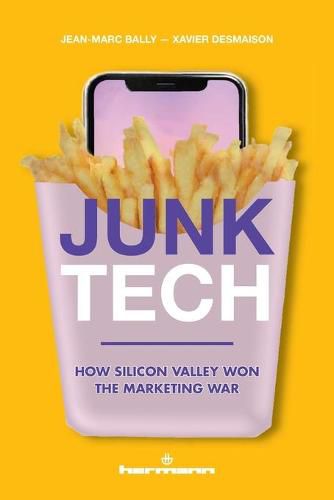Readings Newsletter
Become a Readings Member to make your shopping experience even easier.
Sign in or sign up for free!
You’re not far away from qualifying for FREE standard shipping within Australia
You’ve qualified for FREE standard shipping within Australia
The cart is loading…






This title is printed to order. This book may have been self-published. If so, we cannot guarantee the quality of the content. In the main most books will have gone through the editing process however some may not. We therefore suggest that you be aware of this before ordering this book. If in doubt check either the author or publisher’s details as we are unable to accept any returns unless they are faulty. Please contact us if you have any questions.
Silicon Valley companies have convinced the world that they are successful because of their technological superiority and creative genius. But this is an illusion. To keep consumers and investors hooked, they use a highly addictive substance -junk tech, which subtly combines the ability to tap into the zeitgeist, an understanding of people’s aspirations, the talent to transform these two things into a highly coherent product or service and the power to craft myths that resonate with individual and collective desires. In the digital civilization, dream peddlers and mirage merchants have taken over from engineers, developing a vision of the world that enables them to attract capital, talent, and public attention. In France and Europe, we are trying to reproduce this formula but without the right ingredients. By neglecting the art of storytelling and remaining captive to a technocentric approach, we are adopting the wrong recipe: product hypertrophy, the cult of intellect, a rejection of simplicity, a dependency on rational approaches and a weak cooperative culture. Convinced that we must break with the cult of disruption, this essay argues in favor of the renewal of innovation mechanisms and a stronger focus on the fundamentals of marketing. The stakes are high: building new credible alternatives to compete with Silicon Valley and laying the foundations for sustainable and virtuous business models and innovations that meet the aspirations of today’s citizen-consumers to have a positive impact on the future and the planet.
$9.00 standard shipping within Australia
FREE standard shipping within Australia for orders over $100.00
Express & International shipping calculated at checkout
This title is printed to order. This book may have been self-published. If so, we cannot guarantee the quality of the content. In the main most books will have gone through the editing process however some may not. We therefore suggest that you be aware of this before ordering this book. If in doubt check either the author or publisher’s details as we are unable to accept any returns unless they are faulty. Please contact us if you have any questions.
Silicon Valley companies have convinced the world that they are successful because of their technological superiority and creative genius. But this is an illusion. To keep consumers and investors hooked, they use a highly addictive substance -junk tech, which subtly combines the ability to tap into the zeitgeist, an understanding of people’s aspirations, the talent to transform these two things into a highly coherent product or service and the power to craft myths that resonate with individual and collective desires. In the digital civilization, dream peddlers and mirage merchants have taken over from engineers, developing a vision of the world that enables them to attract capital, talent, and public attention. In France and Europe, we are trying to reproduce this formula but without the right ingredients. By neglecting the art of storytelling and remaining captive to a technocentric approach, we are adopting the wrong recipe: product hypertrophy, the cult of intellect, a rejection of simplicity, a dependency on rational approaches and a weak cooperative culture. Convinced that we must break with the cult of disruption, this essay argues in favor of the renewal of innovation mechanisms and a stronger focus on the fundamentals of marketing. The stakes are high: building new credible alternatives to compete with Silicon Valley and laying the foundations for sustainable and virtuous business models and innovations that meet the aspirations of today’s citizen-consumers to have a positive impact on the future and the planet.